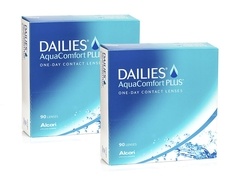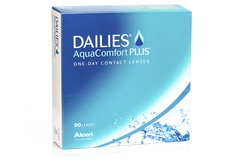Can you swim with contact lenses?

Table of contents
- Can you wear contacts in the sea?
- Risks of swimming with contact lenses
- Is it better to swim with glasses or contacts?
- Tips for swimming with contact lenses
- What to do if you get water in your eyes while wearing contact lenses
- How to care for contact lenses after swimming
- Can you wear contact lenses to the beach?
- Closing thoughts from Lentiamo
Swimming with contact lenses in your eyes can be extremely risky and it's not recommended. The water in swimming pools, rivers, lakes, and oceans is home to bacteria, viruses, and other microorganisms that can cause serious infections.
Simply put, water and contact lenses don't go well together when swimming or even showering. Check out what Lentiamo's eye care experts have to say about the risks of swimming with contacts and tips to follow if you have taken a dip with your lenses.
Can you wear contacts in the sea?
It's not recommended to wear contacts when swimming in the ocean. Discomfort, irritation, and even infection can occur when lenses absorb saltwater. The salt in seawater can stick to your contacts, leading to dryness as well as scratching and roughening of the lens surface.
Can you dive in contact lenses?
Scuba diving with contact lenses isn't a great idea. Because there's a high chance of water coming in contact with your eyes, the safest option is to remove contacts before taking the plunge.
If you must wear your lenses, make sure they're soft contact lenses. Gas permeable lenses allow gas to pass through the lens to your eye. This can result in nitrogen bubbles getting trapped between your eye and the lens during a dive. Blurry vision, discomfort, and even pain can follow if this occurs.
Risks of swimming with contact lenses

Removing contact lenses before swimming is the best way to avoid potential complications. Exposure to chlorine, saltwater, or bacteria in the water can lead to irritation or eye infections. On a practical level, lenses can easily be washed out of your eyes when jumping into a pool or during your swim as well.
Symptoms of eye infection
As we've learned, swimming with contact lenses can lead to infections. This can be irritating but may also be dangerous. It's important to contact an eye care specialist should you experience any new or unusual symptoms after swimming in your lenses. Symptoms of an eye infection can include:
- Swollen or red eyes
- Irritation or itching
- Discharge
- Pain
- Light sensitivity
- Blurred vision
- Watery or dry eyes
Symptoms of eye infections should be taken seriously. One serious infection associated with water and contact lens wear is called acanthamoeba keratitis, which can lead to vision loss or even blindness. It's caused by acanthamoeba, a microscopic amoeba that can be found in many water sources including tap water, lakes, oceans, and more. Acanthamoeba can survive even high concentrations of chlorine in pools.
Is it better to swim with glasses or contacts?
If it can be avoided, removing both contact lenses and glasses when swimming is best. Contacts can absorb water and trap bacteria, viruses, or other pathogens. This can lead to dryness, discomfort, and eye infections.
Wearing glasses when swimming can also be problematic. Glasses or prescription sunglasses can easily fall off and get lost in the water. If they don't have effective hydrophobic to repel water droplets, it can be difficult to see when the lenses get splashed.
Tips for swimming with contact lenses
Sometimes we forget to take out our lenses before going to the beach or pool. If you must swim with contact lenses, there are a few things you can do to protect your eyes and contact lenses:
- Wear tight-fitting goggles that cover your entire eye to keep water out.
- Remove and dispose of your contact lenses immediately after getting out of the water.
- Wearing goggles with daily disposable lenses is a good option as they can be thrown away after use. The best daily lenses provide convenience and are a great hygienic option.
- Wash and dry your hands thoroughly before and after handling your contact lenses.
What to do if you get water in your eyes while wearing contact lenses
If you get water in your eyes while wearing contact lenses, remove them as soon as possible. Don't put your contacts back in until they've been cleaned and disinfected with the appropriate contact lens solution. If you wear daily disposable lenses, simply throw them away and use a fresh pair.
Contact an eye care specialist if pain, redness, discomfort, or blurred vision persist after removing your lenses. This could indicate a possible infection.
Pro tip: Wet contact lenses tend to stick to the eyes, making it more difficult to remove them. If this happens to you, we recommend waiting up to 30 minutes before removing the lenses to prevent irritation.
How to care for contact lenses after swimming
Caring for contact lenses after swimming is important to ensure they're clean and safe to wear. Always wash and dry your hands before handling your lenses. Dispose of daily contacts immediately. Clean and disinfect any reusable contact lenses before inserting them back into your eyes.
Can you wear contact lenses to the beach?

You can wear contact lenses to the beach, but it's important to take some precautions to protect your eyes and lenses from sand, saltwater, and other irritants.
- Reach for a pair of quality sunglasses or contact lenses with UV protection to better block harmful ultraviolet radiation.
- Always remove your lenses before getting in the water.
- Bring along contact lens solution and a case for storage, or pack an extra pair of daily lenses to use after your swim.
- If you plan on sleeping in contact lenses during a quick nap on the beach, remove lenses and store them in a safe place.
Sand and other debris can easily get in your eyes at the beach. If this happens, carefully remove your lens as sand can get between your lens and eye and cause scratching and pain. Reach for your shades for protection and comfort at the beach.
Closing thoughts from Lentiamo
So can you wear contact lenses swimming? We wouldn't recommend it. There are serious consequences for lens wearers that can be avoided with a little extra care. A fun day at the beach or pool shouldn't be impacted by irritated eyes or lost contacts.
We hope this guide is useful if you've found yourself wearing your lenses at the pool or beach.









